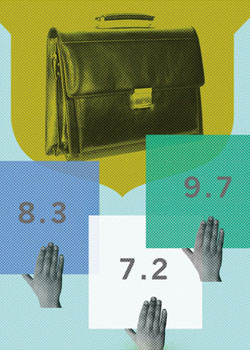ABA Ethics 20/20 Commission Ponders its Strategy for Ranking Lawyers

Illustration by Stuart Bradford
The ABA Commission on Ethics 20/20, already charged with studying a daunting agenda of issues, has been given another tricky assignment: examining how various services go about ranking lawyers.
Publishers of lawyer rankings say they provide a service to both consumers and lawyers. But some in the legal profession express concerns about the validity of information on which rankings are based and whether lawyers may cross ethics boundaries if they share information with ranking companies.
Those concerns were the basis for a recommendation by the New York State Bar Association that was adopted in February by the ABA’s policymaking House of Delegates. The recommendation directs the ABA to “examine any efforts to publish national, state, territorial and local rankings of law firms and law schools.“ Pursuant to the recommendation, the Section of Legal Education and Admissions to the Bar was asked to examine law school rankings, and the Ethics 20/20 Commission was asked to examine law firm rankings.
Carolyn B. Lamm created the commission at the beginning of her term as ABA president in 2009 with the primary mission of studying the legal ethics challenges arising out of advances in technology and increasing globalization. Lamm’s term ended in August.
But key members of the commission say they still are not quite sure how to proceed in carrying out their new mission.
Lawyer rankings were on the agenda when the commission held its most recent meeting in mid-October, but the report from the working group looking at the rankings issue was primarily a matter of status rather than substance.
“We’re still in the information-gathering mode,” said Donald B. Hilliker, who is of counsel in the Chicago office of McDermott Will & Emery. He co-chairs the work ing group with Roberta Cooper Ramo, a partner at Modrall Sperling in Albuquerque, N.M., who was ABA president in 1995-96.
Hilliker reported that the working group has been reaching out to state disciplinary counsel, consumer groups and local bar leaders to find out whether ratings operations have generated any problems or complaints.
METHODOLOGY PROBE URGED
In Chicago, the commission heard from A. Vincent Buzard, who represents the New York State bar in the ABA House of Delegates. Buzard, a member of the Rochester office of Harris Beach, urged the commission to hire an expert to study the methodologies used by companies to come up with their lawyer rankings. “We are the voice of the legal profession,” he said. “If we don’t, who will?”
A finding that those methodologies are not valid and reliable, he said, could trigger ethics issues for lawyers. Sharing information that is used in a way misleading to the public could, for instance, violate Rule 8.4 of the ABA Model Rules of Professional Conduct, under which it is misconduct for a lawyer to “engage in conduct involving dishonesty, fraud, deceit or misrepresentation.” There also is the question of whether lawyers would violate Model Rule 1.6 (Confidentiality of Information) if they share information about clients with companies that rank law firms.
Ramo, however, expressed caution about the viability of taking on such a potentially vast undertaking, especially when the underlying ethics issues still are uncertain. She also noted that concerns about lawyer rankings have been expressed only recently, even though a number of such services have been around for years without triggering serious complaints.
The commission also heard from three invited representatives of companies that rank lawyers, who all claimed that their methodologies are valid. Joshua King, vice president of business development and general counsel of Avvo, which publishes an online directory of attorneys who are rated on scale of 1 to 10, said the company uses a formula that takes into account factors such as education, work experience, licenses, publications, awards, testimonials from other lawyers and disciplinary records. But he declined to offer many details about the formula. “We like to think of it as our secret sauce,” he said.
Correction
Due to an editing error, this article in the December issue incorrectly describes a recommendation adopted by the ABA House of Delegates in February 2010. The adopted version of the recommendation states: “Resolved, that the American Bar Association examine any efforts to publish national, state, territorial and local rankings of law firms and law schools.” Pursuant to the recommendation, the Section of Legal Education and Admissions to the Bar was asked to examine law school rankings, and the Ethics 20/20 Commission was asked to examine law firm rankings.The ABA Journal regrets the error.



